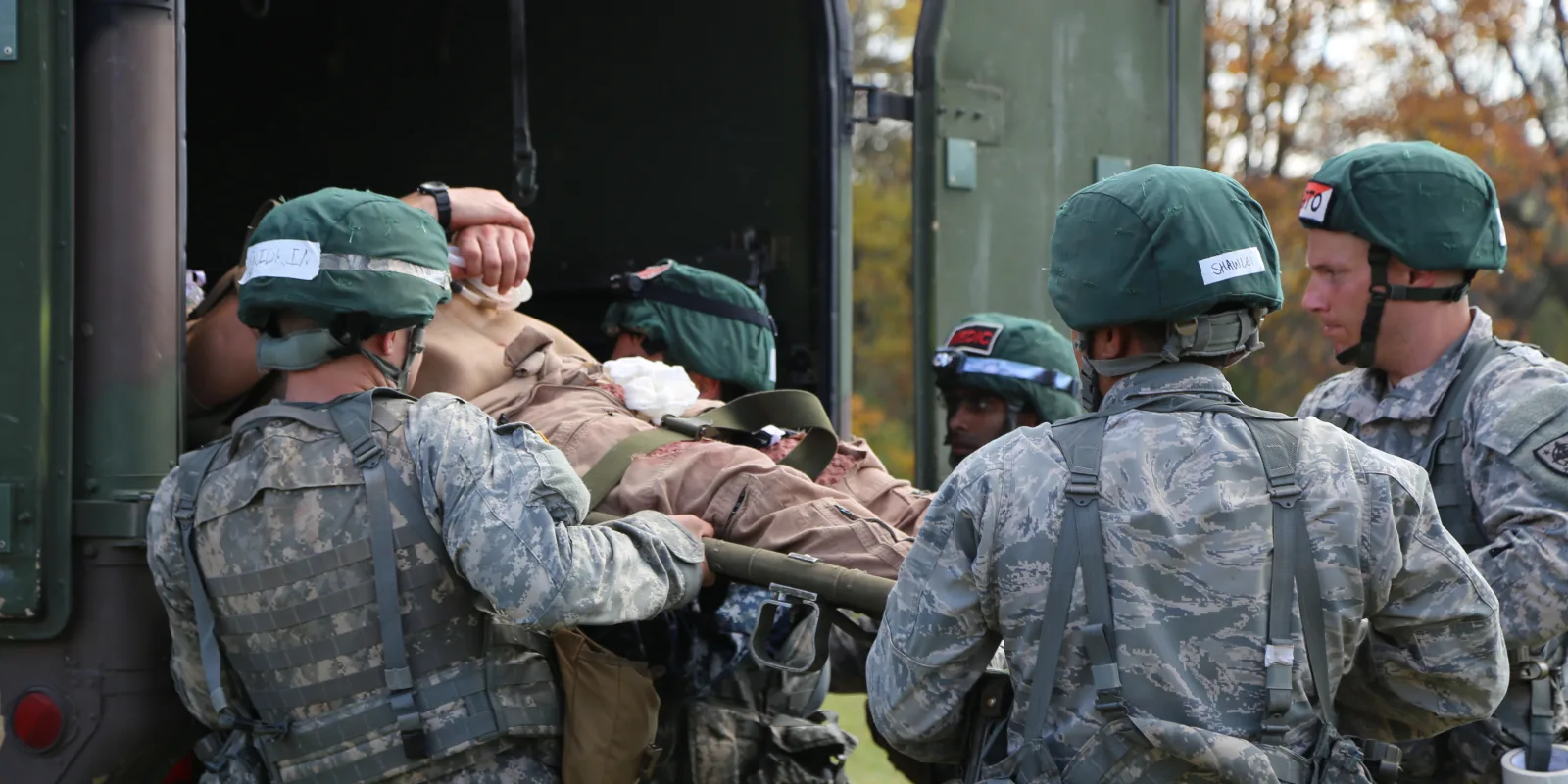
The sounds of gunfire and exploding bombs cut through the cold and otherwise quiet, Pennsylvania night. Calls from the "wounded" only add to the chaos on a mock battlefield in Fort Indiantown Gap, Pennsylvania.
Each October, students at the Uniformed Services University of the Health Sciences School of Medicine and Graduate School of Nursing participate in a grueling, four-day-long medical field practicum nicknamed "Operation Bushmaster" at an Army National Guard training base in central Pennsylvania.
Hundreds of military health care providers and Emergency Medicine experts fly in from all over the United States to help run this one-of-a-kind exercise. Bushmaster augments lessons students learn in the classroom "There is no other medical school that runs anything like this," said Major (Dr.) Kevin Semelrath, the Course Director for Operation Bushmaster. Since all USUHS graduates end up deployed in the military health system at some point in their careers, the exercise helps prepare them for what they will see in their future service.
Operation Bushmaster
Operation Bushmaster, in some form, has been a part of the curriculum at USUHS since it was founded in 1972. Over the years, the focus of the exercise has shifted from medical care to leadership. Students are urged to think about how they would lead others in their platoon in addition to medical outcomes of their patients.
It serves as the final exam for the Military and Contingency Medicine course, in which classes are woven throughout the four-year medical curriculum. Students are immersed in Bushmaster during their first couple of months of medical school by filling roles as wounded patients in the exercise. According to Cameron Elward, M4, who recently completed this year's iteration of Operation Bushmaster, students "learn about the different echelons of care in the military" throughout the course.
Students also gain a strong understanding of the military health system and its challenges.
The purpose of the entire activity "is really to move our students to see themselves as military medical officers," Major Semelrath explained. The operation itself includes M4s, senior nursing students, and medical students from partner nations including the UK, France, Mexico, Japan, New Zealand, and Egypt.

Bushmaster 2018
This year, students were deployed to the fictional country, Atropia. Before deployment students spent two weeks in the classroom learning about Atropia and the skills they would need to succeed in the practicum. Among the many topics covered, the more noteworthy include medical threat analysis, clinical field medicine, and combat stress control.
During the four-day practicum portion, students participated in everything from global health engagement to combat casualties to media encounters. Students are rotated through various leadership roles every four hours, which is a "day" in the fictional world of Atropia. Leadership roles include Platoon Leader, Assistant Platoon Leader, Surgeon, Combat Stress Control, Ambulance Team Lead, and Preventive Medicine lead. Students are unaware of when they are going to be cast in the various roles, making adaptability a key component of attaining success in the operation.
Elward and Lucas Miller, both M4s with extensive experience in Special Forces and the National Guard, both agreed that the Platoon Leader and Assistant Platoon Leader roles were the most stressful. According to Miller, "they're throwing a million things at you, and the natural reaction is to get pulled into each little thing. You have to pull back, task organize, and dish out to your other team leaders. That way you're talking to five people versus 30."
One of the key skills faculty emphasized in the course and throughout the four-week experience was the importance of the continuity of information in a constantly changing environment. As platoon leadership changes so rapidly, information handoffs become essential to providing good care. When reflecting on Operation Bushmaster, Miller noted leadership and resiliency to be key skills necessary for success.
"The operation was particularly challenging because of the 18+ hour-long days and sleeping in the cold, being placed in leadership roles that are outside of your comfort zone, and trying to balance all the medical knowledge we've learned with leadership skills," said Elward. But despite tough conditions, the students deeply appreciate the effort and time invested by the 100+ faculty members involved who helped create the best learning experience for them. Both students independently expressed how much fun they had during the exercise despite the level of stress. Even Miller who has participated in other simulation exercises in past military training cited it as "absolutely beneficial, and an amazing, very well put together exercise."

Simulation in medical education
Operation Bushmaster is the most complex and intricate simulation that students participate in during their time at USUHS. But it is also not the first simulation they participate in during their medical education. As far as leadership and handling medical care in combat scenarios go, "It was crawl, walk, run. They built us up throughout medical school, culminating with Bushmaster," said Miller.
USUHS does an excellent job of ensuring students are confident in their practical medical and leadership skills--something that most other medical schools leave residency programs to handle. Miller said, "I want to make a mistake when it doesn't matter. What I don't want to do is make a mistake when it does matter and cost someone their life. Exercises like this are invaluable for that."
After the capstone experience that they've been working up to for four years, students return to clinical rotations and head off to residency. Cameron Elward hopes to head into Pediatrics while Lucas Miller hopes to head into Emergency Medicine.






